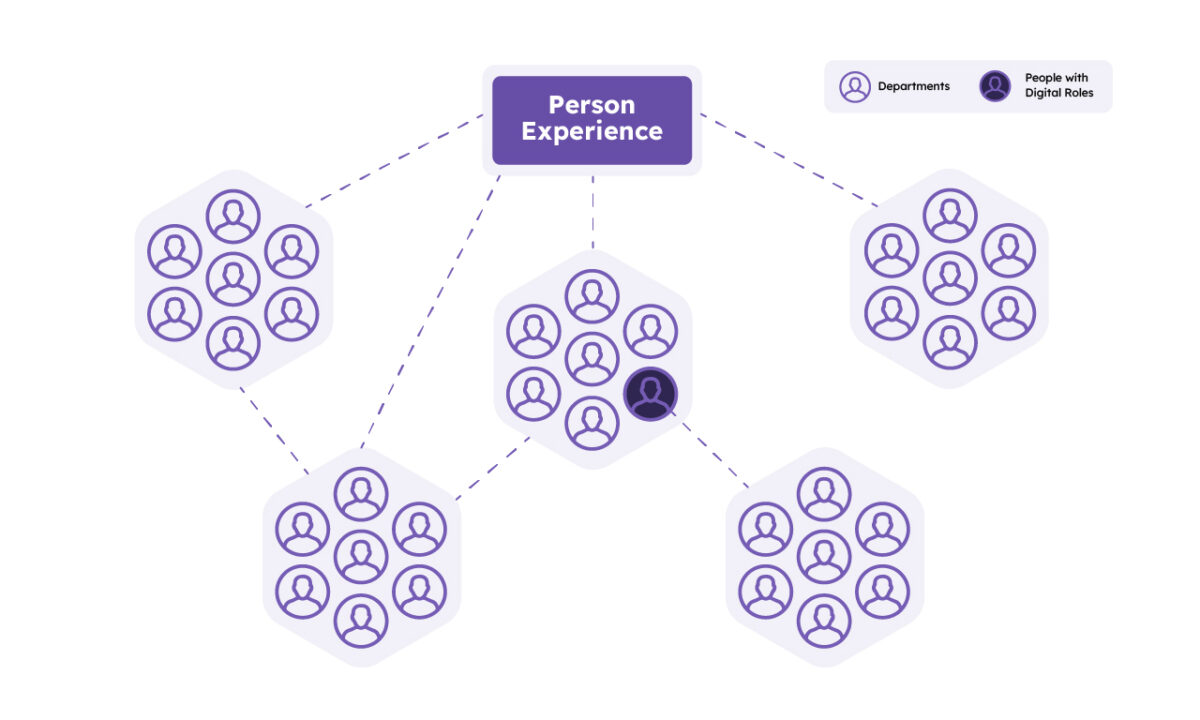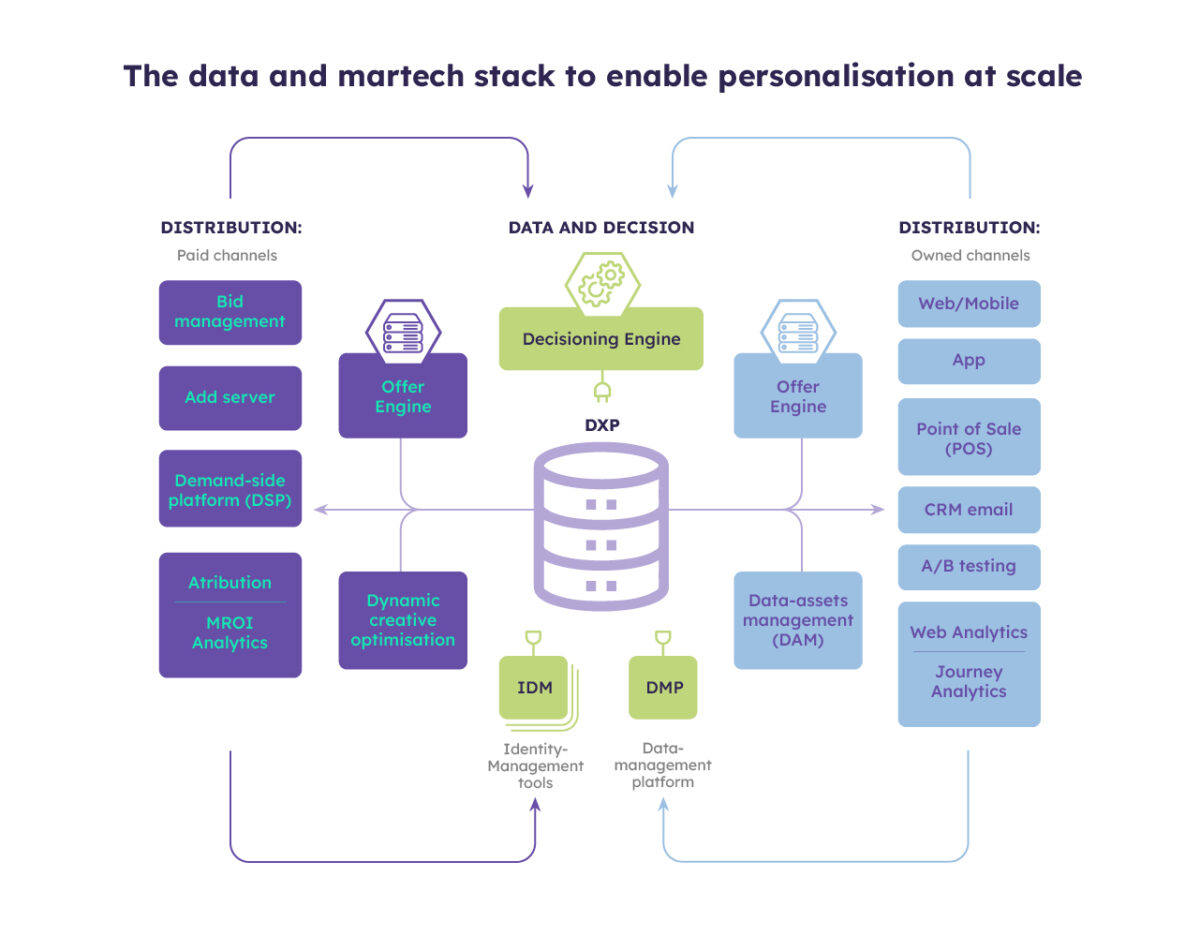
Digital acceleration and the proliferation of smart devices, tracking technology, and ability to store mass amounts of data have made data-driven personalisation more accessible than ever before. Personalisation can be defined as the ability to adapt a service or product to satisfy user needs. Personalisation has been proven to drive a 10-15% lift in revenue, even amongst enterprises without direct consumer relationships. The more adept an organisation is at applying data to their personalisation efforts, the greater the return.
Creating personalised experiences
In a digital-first world, personalisation goes beyond distributing the right content at the right time. Digital experience maturity occurs when customer insights are combined with the ability to react rapidly and form a loop of continuous learning for improvement. For digital leaders, personalisation isn’t just how they market, it’s how they operate.
Enterprise organisations are well-positioned to enable personal experiences as they enjoy both large customer bases, and a high amount of data per customer. However, there are a number of challenges for scaling personalisation and it can be easy to get lost in various technologies, the vast sea of customer data and endless possibilities of personalisation.
Digital experience platforms act as a single source of truth for customer profiles and facilitate the distribution of up-to-date, approved assets across channels from a single back end. SaaS DXPs means that content can be optimised for different channels without extensive deconstruction and implementation. Most importantly, this helps to solve some of the complexity that comes with implementing personalisation at scale, giving enterprises more freedom to make experience-led decisions rather than viewing personalisation as a technology challenge.
Three steps for scaling personalisation
For enterprise organisations, there are several steps to shift from personalisation as a marketing tactic to personalisation as core to how they operate.
Organisation model

As organisations increasingly adopt and reap the transformational benefits of agile operating models, it’s important to embed personalisation within this transformation. To scale personalisation across your organisation, a centralised personalisation team focused on data-driven experience design can be a powerful means of instilling personalisation as an organisation-wide imperative.
Whilst the right customer data platform and DXP can ensure your data is integrated, it’s also important to solve the people’s challenge. People are the gatekeepers of data and channel owners may have little incentive to focus on how and what data is shared with other channels. Centralised and cross-functional teams bridge this disconnection and ensure your data is clustered in one place to reduce silos. They also make it easier to monitor personalisation efforts, reduce redundant testing, and ensure your personalisation north star remains front of mind. The centralised group is aware of what each ‘spoke’ is doing across the organisation and provides a holistic experience to customers with centralised resources. This model requires executive backing and cross-department buy-in which is often challenging but also a necessary step to ensuring organisation-wide awareness and support for personalisation efforts.
The personalisation team should also operate based on two roadmaps, one focused on customer experience problems and the other focused on scaling operations. To ensure the team is solving the most impactful customer experience problems, frameworks like ‘Problem Solution Mapping’ ensure your roadmap remains focused on goals rather than the next big idea.

Integration of customer data, decisioning and distribution
One of the most common challenges when leveraging data for personalisation is having customer data dispersed across disconnected systems and stakeholders. A customer data platform (CDP) can integrate customer data from different systems and can come out of the box with some DXPs. When set up correctly, an integrated CDP allows you to gain a 360° view of customers, segment audiences based on existing or custom attributes, and execute personalisation variants across digital channels. This provides organisations with three critical data management requirements for data-driven personalisation.
In terms of decisioning, DXPs will also offer models to score customers at the individual level which allow organisations to deliver a logical next step based on individual and microsegment behaviour. By connecting data, decisioning and distribution it’s possible to build the right infrastructure foundation for personalisation at scale.
Operating a content factory
As organisations are increasingly expected to engage with their customers at point-of-need, whether it’s via a website, smartwatch or even through emerging technologies such as AR (Augmented Reality) it can be hard to produce the volume of content and level of experimentation demanded by personalisation.
This mandates a shift from traditional design processes focused on creating bespoke content, to enabling personalisation at the presentation layer, i.e. by mixing and matching modular pieces of content into dynamically populated templates. To do this effectively, organisations will need a digital-asset-management (DAM) repository organised based on factors such as channel, product category, customer segment and offer type.
